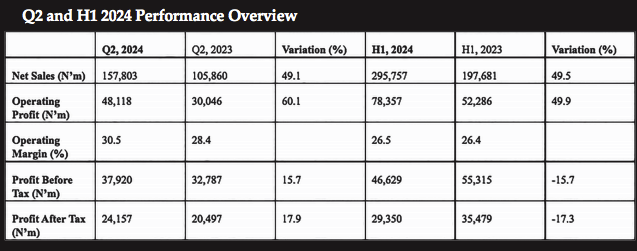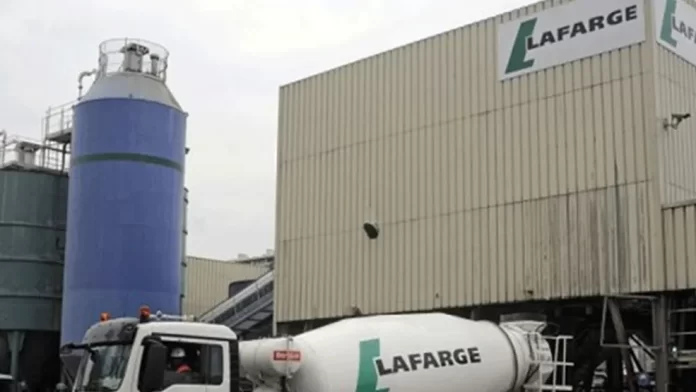Winning the battle against rising finance costs is the biggest challenge confronting Nigeria’s third-largest cement producer, Lafarge Africa Plc.
(Financing cost (FC), also known as the cost of finances (COF), is the cost, interest, and other charges involved in the borrowing of money to do business.)
Analysis of the company’s financial documents for the half-year period ended June 30, 2024, made available to the stock market community, recently, showed that it is struggling to remain in business as finance cost increased significantly to N33.3 billion in H1 compared with N1.4 billion recorded in the previous year due to the continuous devaluation of the Naira.
A breakdown of the finance cost revealed that foreign exchange loss accounted for 58 percent of the total cost. In the reviewed period FX loss rose to N19 billion, followed by bank charges and interest expense on borrowing amounted to N12 billion and N429 billion, respectively.
Background
Lafarge Africa Plc otherwise known as Lafarge Wapco, has been listed on the Nigerian Stock Exchange since February 17th, 1979. It is currently the 17th most valuable stock on the NGX with a market capitalization of N 593 billion, which is about 1.07 percent of the Nigerian Stock Exchange equity market. The stock trails behind industry leaders Dangote Cement Plc and BUA Cement in the Industrial Goods sector and Building materials subsector of the NGX.
The company is a member of Holcim Limited, a world leader in building solutions, accelerating the world’s green transformation. Listed on the Nigerian Exchange Group, Lafarge Africa is actively participating in the urbanization and economic growth of Nigeria, the largest economy in Africa.
Lafarge Africa has the widest footprint in Nigeria with cement operations in the South West (Ewekoro and Sagamu in Ogun State), North East (Ashaka, in Gombe State), South East (Mfamosing, Cross Rivers State) with Ready-Mix operations in Lagos, Abuja and Port Harcourt. Lafarge Africa has a current installed cement production capacity of 10.5Mtpa. Lafarge Africa leverages its innovative expertise to provide value-added products and services solutions in the building and construction industry in Nigeria.
Board/Management
The 12-member board of directors of Lafarge Africa Plc is headed by Gbenga Oyebode, a boardroom guru. Gbenga Oyebode, the co-founder of Aluko & Oyebode, one of the largest integrated law firms in Nigeria, was appointed to lead the company in April 2024. Oyebode succeeded Adebode Adefioye, who voluntarily retired as chairman, according to a statement on Tuesday.
The chairman has over 42 years of experience in legal, corporate governance, and business operations, having graduated from the University of Ife (LL.B Honours), and the University of Pennsylvania, Philadelphia (LL.M). Oyebode is the chairman of Okomu Oil Palm Company Plc, Chairman of Nestle Nigeria Plc, and Chairman of CFAO Nigeria. He was the chairman of the Board of Access Bank from 2005-2015, a member of the Board of MTN Nigeria Plc from 2001 to 2019, and a Trustee of the Ford Foundation New York.
Financials
According to the company’s latest unaudited financial result, its after-tax profit fell by 17 percent to N29 billion in H1 this year from N35.4 billion in the same period of 2023, driven by finance costs.
The company’s finance cost increased significantly to N33.3 billion in H1 compared with N1.4 billion recorded in the previous year due to the continuous devaluation of the Naira.
“Analysis of the company’s financial documents for the half-year period ended June 30, 2024, made available to the stock market community, recently, showed that it is struggling to remain in business as finance cost increased significantly to N33.3 billion in H1 compared with N1.4 billion recorded in the previous year due to the continuous devaluation of the Naira”
A breakdown of the finance cost revealed that foreign exchange loss accounted for 58 percent of the total cost. In the reviewed period FX loss rose to N19 billion, followed by bank charges and interest expense on borrowing amounted to N12 billion and N429 billion, respectively.
Analysts at Cardinalstone in a note said, “Cost pressures, FX revaluation losses, and a higher effective tax rate masked top line growth.”
During the period, revenue growth was strong at 49.5 percent to N295.6 billion, driven by higher revenue per tonne and volumes.
However, the cost of goods sold grew at a faster pace 56.9 percent to N147 billion due to a 64.5 percent increase in production variable costs, which included energy and raw materials costs. Subsequently, the gross margin contracted by 49 percent to N147 billion from N103 billion.
Cardinalstone disclosed that “Operating expenses remained elevated (36.6 percent year-on-year) due to rising distribution costs and a 3.3x surge in office and general expenses. However, a 290.0 percent year-on-year increase in other income — from government grants, gains on PPE disposal, and the sale of scraps — offset the higher OPEX, slightly improving the EBIT margin by 0.2ppts to 26.7 percent.
The company’s earnings per share EPS) declined by 17.3 percent to N1.82 from N2.20, this drop was driven by the sustained FX loss reported in the first quarter of 2024.
During the period, the total assets of the company rose to N735 billion, total liabilities rose to N301 billion and the company’s shareholders funds surged to N433 billion.
Management’s comment
The CEO of Lafarge Africa, Lolu Alade-Akinyemi, commented, “We sustained Net sales growth in Q2 2024 but saw H1 2024 PAT decline 17.3% vs PY due to foreign exchange losses resulting from Naira devaluation in H1 2024.
“Our strategic and cost management initiatives have contributed to improved results despite severe macroeconomic challenges. We remain steadfast in our resolve to drive innovation and accelerate green growth in line with our sustainability ambitions while also delivering value to our stakeholders.
“I would like to thank our esteemed customers, employees and all other stakeholders of Lafarge Africa for their commitment despite the macroeconomic headwinds being experienced in the industry.”
Business update
Lafarge Africa unveiled Watershield Cement in Q1 and the product continues to make good strides in the market. This product has started to redefine industry standards, offering a solution previously unseen in construction materials. Lafarge Watershield Cement prevents water from permeating into buildings, thus ensuring the durability of the structure. This can be used for new structures and for remedial works where rust marks or seepage is evident on the building.
Decarbonisation and innovation
Lafarge Africa will launch its first ECOPlanet cement in Q3 to further strengthen its commitment towards a greener planet. The product is expected to further reduce our carbon footprint in the industry. Lafarge Africa is also set to introduce CALCINED CLAY, which is low low-carbon raw material, into its cement manufacturing process, which will in turn reduce our CO2 emission and carbon footprint.
Outlook
“The Nigerian Infrastructure and Construction Sector is expected to continue to grow despite inflationary pressure on purchasing power. As a result, we maintain our positive outlook, with market recovery expected in the second half of the year. We will continue to maximize volume opportunities across our markets and actively manage our costs. The company remains committed to its sustainability ambitions and strategy of ‘Accelerating Green Growth’ through innovative building solutions and delivery of stakeholder value,” the company said.
Green flags
1. Growing revenue
2. Good corporate governance
3. Sustained profitability
4. Green innovation
Red flags
1. Rising finance costs
2. Stiff market competition
3. Escalating forex loss.


